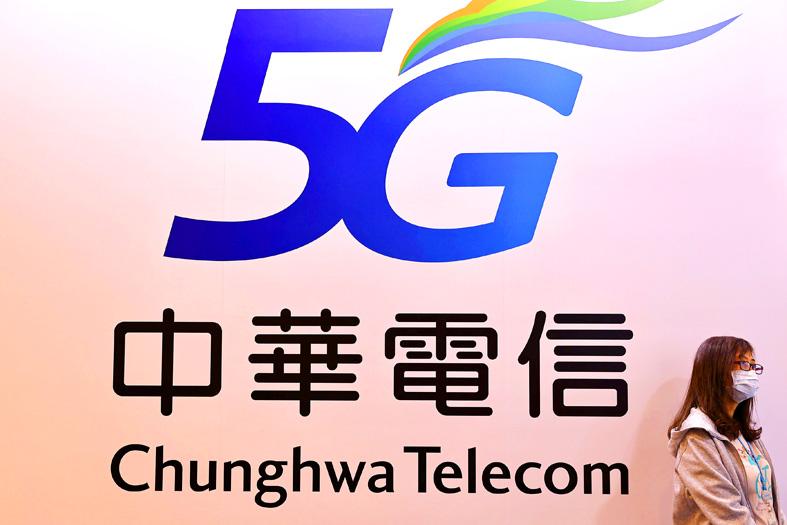Less than six months after the launch of 5G services, the number of users in Taiwan has surpassed 1 million, statistics released by the nation’s telecoms showed.
Taiwan in June issued its first 5G license to Chunghwa Telecom Co (中華電信), and the company started its services in July.
Four other telecoms — Far EasTone Telecommunications Co (遠傳電信), Taiwan Mobile Co (台灣大哥大), Taiwan Star Telecom Corp (台灣之星) and Asia Pacific Telecom Co (亞太電信) — soon followed suit to start 5G services in the summer.

Photo: Ann Wang, Reuters
Chunghwa Telecom said that its number of 5G subscribers has topped 300,000 and would likely rise to 500,000 by the end of this year.
Subscriptions to 5G services have exceeded the firm’s expectations, as it has previously aimed to sign up 300,000 users by the end of the year, the company said.
Chunghwa Telecom would invest more than NT$10 billion (US$351.62 million) next year to improve its mobile communication infrastructure, Chunghwa Telecom chairman Sheih Chi-mau (謝繼茂) said.
So far, Chunghwa Telecom has built more than 4,000 5G base stations, Sheih said.
Far EasTone has signed up about 300,000 5G subscribers since the launch of its services in July, topping the company’s expectations, the company said.
Far EasTone president Chee Ching (井琪) said that the company is determined to strengthen its 5G infrastructure to gain a greater market share.
Taiwan Mobile has also signed up about 300,000 5G users, exceeding its expectations of the number of people who quickly adopted the new technology, the company said.
Taiwan Mobile expects that 5G users would account for 15 to 20 percent of its total subscribers by the end of next year, Taiwan Mobile president Jamie Lin (林之晨) said.
Taiwan Star Telecom and Asia Pacific Telecom each signed up more than 100,000 5G subscribers, statistics released by the respective companies showed.

Zhang Yazhou was sitting in the passenger seat of her Tesla Model 3 when she said she heard her father’s panicked voice: The brakes do not work. Approaching a red light, her father swerved around two cars before plowing into a sport utility vehicle and a sedan, and crashing into a large concrete barrier. Stunned, Zhang gazed at the deflating airbag in front of her. She could never have imagined what was to come: Tesla Inc sued her for defamation for complaining publicly about the vehicles brakes — and won. A Chinese court ordered Zhang to pay more than US$23,000 in

Taiwan Semiconductor Manufacturing Co (TSMC, 台積電) yesterday said that its investment plan in Arizona is going according to schedule, following a local media report claiming that the company is planning to break ground on its third wafer fab in the US in June. In a statement, TSMC said it does not comment on market speculation, but that its investments in Arizona are proceeding well. TSMC is investing more than US$65 billion in Arizona to build three advanced wafer fabs. The first one has started production using the 4-nanometer (nm) process, while the second one would start mass production using the

A TAIWAN DEAL: TSMC is in early talks to fully operate Intel’s US semiconductor factories in a deal first raised by Trump officials, but Intel’s interest is uncertain Broadcom Inc has had informal talks with its advisers about making a bid for Intel Corp’s chip-design and marketing business, the Wall Street Journal reported, citing people familiar with the matter. Nothing has been submitted to Intel and Broadcom could decide not to pursue a deal, according to the Journal. Bloomberg News earlier reported that Taiwan Semiconductor Manufacturing Co (TSMC, 台積電) is in early talks for a controlling stake in Intel’s factories at the request of officials at US President Donald Trump’s administration, as the president looks to boost US manufacturing and maintain the country’s leadership in critical technologies. Trump officials raised the

From George Clooney to LeBron James, celebrities in the US have cashed in on tequila’s soaring popularity, but in Mexico, producers of the agave plant used to make the country’s most famous liquor are nursing a nasty hangover. Instead of bringing a long period of prosperity for farmers of the spiky succulent, the tequila boom has created a supply glut that sent agave prices slumping. Mexican tequila exports surged from 224 million liters in 2018 to a record 402 million last year, according to the Tequila Regulatory Council, which oversees qualification for the internationally recognized denomination of origin label. The US, Germany, Spain,